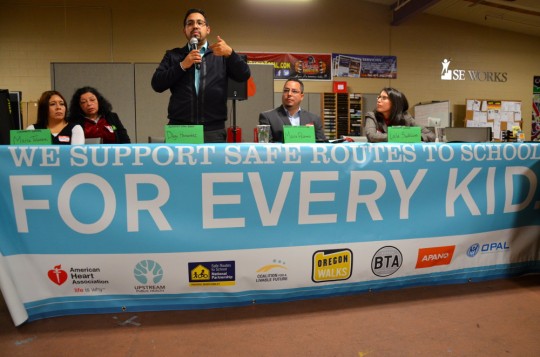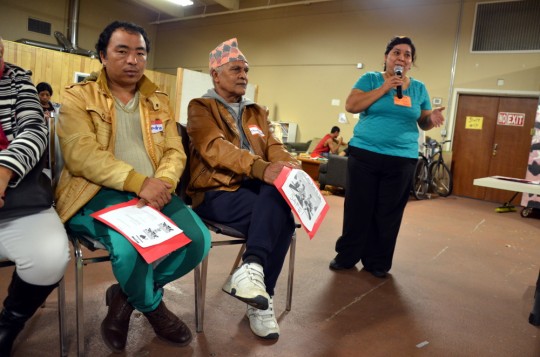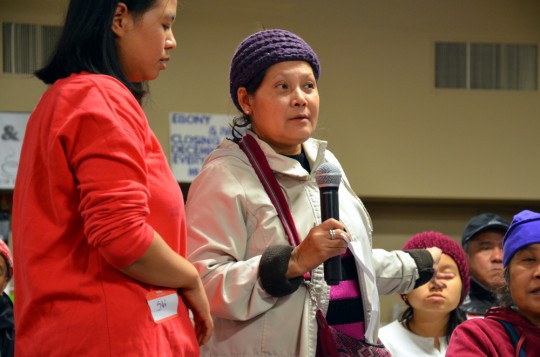
(Photos: M.Andersen/BikePortland)
Portland’s largest biking advocacy group has, for the first time, created a written policy to help it fight racial disparities in transportation.
“The reality of Portland is that while we are one of the whitest cities in America, it’s not going to be a white city forever.”
— Rob Sadowsky, BTA
As the most bikeable areas of Portland grow even whiter and many less bikeable areas grow even more diverse, the group says it needs to focus more on building “a community where everyone from all racial backgrounds has access to safe, healthy, and affordable transportation options.”
“The reality of Portland is that while we are one of the whitest cities in America, it’s not going to be a white city forever,” Executive Director Rob Sadowsky said Wednesday. “Over half of Portland Public Schools students already are students of color.”
(Update 2:50 p.m.: Looks like Sadowsky was about 6 percentage points off: 44 percent of PPS students identify as something other than white. “I got it from the Coalition for Communities of Color and just trusted them,” he writes. “The gist of point remains the same.” It’s also worth noting that David Douglas students who live in Portland might push the citywide white public school student population under 50 percent. Thanks to commenters Random and Daisy for getting us straight on this.)
This new focus is arriving alongside what’s probably the BTA’s single biggest campaign at the moment, the For Every Kid effort to convince Metro to dedicate a share of its federal money to a region-wide Safe Routes to School program.
At a meeting near the Portland/Gresham border Tuesday night, the BTA teamed up with the Community Alliance of Tenants to give speakers of five different languages a chance to talk about their desire for streets safe enough to comfortably walk and bike on: streets with more lighting, more stoplights and fewer drunk drivers.

“Our solutions for ‘make big streets safe’ in East Portland, they look very different from what we’re looking for on Barbur,” Sadowsky said.
The “Racial Equity Policy Statement” approved by the BTA’s board includes this passage:
• We have not consistently stood with culturally and community-based organizations in countering displacement caused by gentrifying investments including bikeway improvements.
• Our organization and our movement have not done enough to listen to the concerns and priorities of communities of color.
• With more than 50% of youth in our schools being people of color, we cannot afford for these inequities to persist and for an increasingly smaller percentage of our community members to share in community prosperity.
• We know that diversity in cycling exists and the number of people of color biking continues to grow. People of color are leading the US biking boom.
• Metro’s Regional Active Transportation Plan found that “in the 4-county region, nonwhite householders make a greater percentage of their trips by walking, bicycling and transit than white householders.”
Advertisement
To get these goals done, Sadowsky said the BTA will recruit a diversity task force that includes people both on and off its staff and create an “action plan with clear accountability and metrics, including prioritizing budget allocations and staffing, which will result in measurable results on a yearly basis towards achieving action plan goals.”
Elizabeth Quiroz, a member of the BTA’s four-person advocacy team, now has the additional title of equity manager. She said that the BTA’s approach to more equitable advocacy is mostly about changing its processes for selecting policy priorities, since its current staff and volunteer base don’t necessarily know what communities of color need and want.
“We realize that we’re not experts,” Quiroz said Thursday. “There’s a lot of disparities, a lot of transportation burdens, and they’ve been distributed unequally, specifically in communities of color. … A lot of these groups haven’t really been at the table, haven’t been part of the decision-making.”
Quiroz said that as part of the BTA’s effort, it’s “looking to our other colleagues like the CCC that have advanced more in this work.”
Sadowsky said that many white-dominated nonprofits have a tendency to “stand outside of the community, on the other side of the fence, and throw things in.”
“Our role is not to throw solutions over the fence,” he said. “Our role is to open that gate so solutions go both ways, and to listen, first and foremost, to what communities want.”

He said the BTA’s spending some of its energy trying to ensure that its work benefits people of color will also ultimately make the group better at making biking better for white people.
“Just from a survival mode, it makes sense,” Sadowsky said. “But it feels right. It’s exciting. It’s almost reinvigorated some of our staff’s energy. … People used to say, ‘Oh, that’s east of 82nd Street, I’m not gonna live there.’ People are all of a sudden saying, ‘I’m going to have to live there because I can’t afford to live anywhere else.'”
Correction 12:45 p.m.: A previous version of this post gave the wrong school affiliation for Diego Hernandez. Also at 12:45 p.m.: Added comments from Quiroz.
— Michael Andersen, (503) 333-7824 – michael@bikeportland.org

